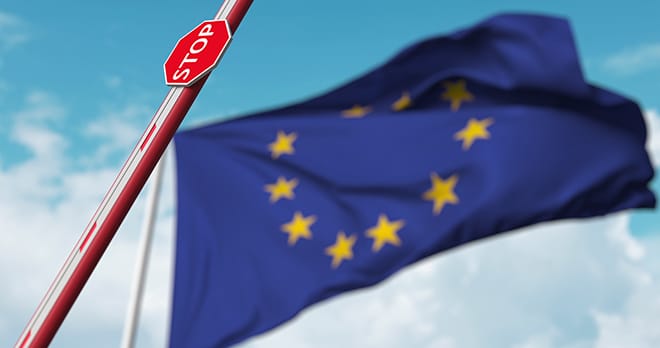Shellfish, ham sandwiches, or court documents: which can you take into the European Union post Brexit?

In the last few weeks, the shellfish industry has been making headlines as EU rules prevent import of untreated live bivalve molluscs (which we know as oysters, mussels, clams, cockles and scallops) harvested from Class B waters. On a slightly lighter if no less frustrating note, UK lorry drivers have had their ham [insert any alternative meat or dairy equivalent of your choice] sandwiches confiscated on arrival in the Netherlands.
In other words: the rules that EU (with the UK as its member at the time) put in place for non-EU countries now apply to the UK.
What of court documents?
On the legal side, Brexit has seen the end of the UK's participation in the European Regulations on service of court documents.
If seemingly obvious items such as shellfish [and many other trade goods] or delivery drivers' packed lunches can't be taken into Europe and the UK no longer participates in EU agreements on service of documents, how will you be able to commence or progress claims against individuals and/or entities domiciled in Europe?
The Hague Convention on service
Fortunately, unlike the meat and/or dairy products in truck drivers' lunches, service of court documents abroad (outside the European Union) has long been governed by one of the many Hague Conventions. The UK has been a signatory of this particular convention since 1967 and conveniently all 27 EU member states are also signatories.
The convention sets out a structure that all signatory countries must have in place for the service of documents and the provision of evidence that documents have been served. It is quite a formal process with documents being sent through a central authority – for England and Wales this is the Foreign Process Section based at the Royal Courts of Justice in London.
However, the convention also sets out that official documents can be served through competent persons (the UK has confirmed that lawyers are deemed competent) or even by postal services.
It is important to note that each country has the ability to fully accept, reject or modify the options set out in the above paragraph. For example, Bulgaria and a number of EU member states have opted out of the more relaxed forms of service completely, whilst France allows all methods detailed in the convention.
It is also important to remember that many countries will require translation prior to arranging for service. There is a handy status table available on the Hague Convention website which sets out this information on a country-by-country basis .
Claims coming from the EU
The UK has not opted out of service by post. Therefore, if you receive court documents from a claimant in an EU member state in the post, this would be deemed served effectively.
Claims instituted prior to Brexit
It is important to remember that claims that were commenced prior to Brexit (i.e. 31 December 2020) will still be governed by EU Regulations. In the UK claims are instituted when they are issued by the court. In the EU each member state has separate rules on when a claim is instituted, so it will be important to check whether the claim was successfully instituted prior to Brexit.
Conclusion
The overwhelming result of Brexit on the service of documents is that old EU-centric regulations have been replaced by international conventions. Crucially, unlike untreated shellfish and ham sandwiches, court documents will be allowed in.
However, it is very important to discuss these matters with your lawyer as many of the conventions rely on or are affected by the internal law of signatories. Similarly, the timing of the start of proceedings will be crucial when looking at which regulations to apply.